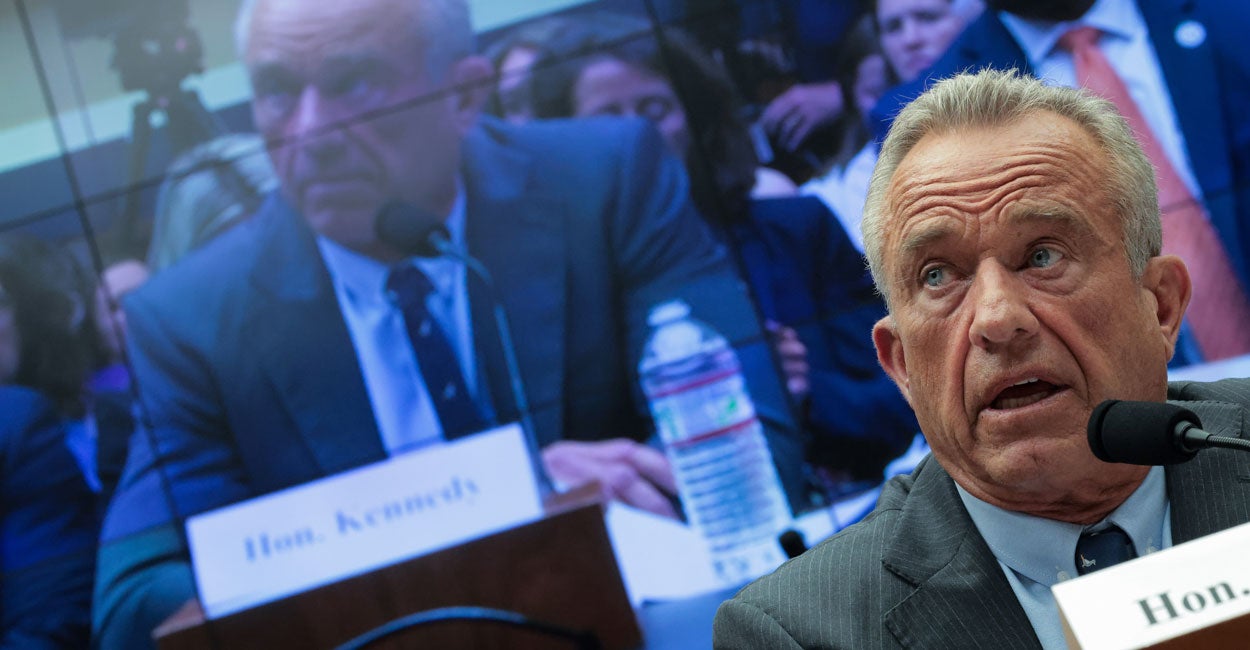RFK Jr. Cleans House: New Team to Reevaluate COVID-19 Vaccines, Conflict-of-Interest Rules

Following the dismissal of 17 members from a federal vaccine advisory committee in early June, big changes are on the horizon at the Centers for Disease Control and Prevention.
Live Your Best Retirement
Fun • Funds • Fitness • Freedom
The Daily Signal spoke with a federal health policy expert about the impact of those changes. Robert Moffit, a senior research fellow at The Heritage Foundation’s Center for Health and Welfare Policy, discussed the removal of members from the Advisory Committee on Immunization Practices and President Donald Trump’s health policy agenda.
Moffit, editor of the book “Modernizing Medicare,” expects a reevaluation of COVID-19 vaccines, an increase in vaccine testing, and a thorough examination of the conflict-of-interest rules regarding vaccine and medical device approval.
The following interview has been edited for length and clarity.
Philip Roberts: What is the purpose of the Advisory Committee on Immunization Practices?
Robert Moffit: To make recommendations for the vaccine schedule for CDC, and for them in turn to make recommendations to states and local public health officials about what vaccines are appropriate and what vaccines are not. That’s what CDC is supposed to do.
Secretary Robert F. Kennedy Jr. did exactly the right thing by firing all the Biden appointees. After all, they represented the policy agenda of the previous administration and, in several instances, they were politically engaged as financial supporters of the Democratic Party. It is profoundly naïve to believe that Biden’s appointees were merely disinterested scientists with no financial ties to the pharmaceutical industry.
Vice President Kamala Harris, the candidate of the Biden-Harris administration, was defeated at the polls. Elections have consequences, and Americans voted for change. It is critically important for the new president and his team to have their own people in place. In the case of the Biden administration, his appointees presided over vaccine policies that were profoundly flawed, especially the illegal and unprecedented COVID-19 vaccine mandates.
Kennedy has taken the right course of action by getting rid of the previous administration appointees and putting in his own.
Roberts: Can you explain what happened with the removal of ACIP members?
Moffit: Again, the Biden administration’s policies were repudiated at the polls. In a democratic society, the government is expected to represent the will of the people. It is democratic imperative that the newly elected president, and his appointees, such as Secretary Kennedy, can carry the policy changes that they promised the American people.
So, Kennedy has put in a new team to pursue a new set of policies, specifically with regard to the COVID-19 vaccine schedule.
Following the unhappy experience of the pandemic, the COVID-19 vaccine policies became the central issue. We have had accumulating data on adverse events from these COVID vaccines, especially serious heart inflammation among young men. There must be a more comprehensive evaluation of the safety and effectiveness of the COVID vaccines, and that is what Secretary Kennedy and Dr. Marty Makary, the new commissioner of the Food and Drug Administration (FDA) has promised.
Roberts: Was this removal expected?
Moffit: It should have been. When you change administrations, you’re changing personnel.
And as the great Ed Feulner, the former president of The Heritage Foundation, has said, “Personnel is policy.”
In recommending a vaccine, there must, of course, be rigorous scientific analysis before any recommendation, focused not only on its safety and effectiveness, but also its medical necessity or appropriateness for different cohorts of the population. Moreover, when it comes to the best course of action on behalf of a large and diverse public, there are policy questions. So, yes, a change in policy requires a change in personnel.
And speaking of political implications, it is curious that the Biden administration appointed a disproportionate number of the ACIP in 2024, the last year of the Biden administration. As Kennedy pointed out, if he did not act, he would have been prevented from appointing a majority of the members of this advisory committee until 2028.
No doubt, the Biden team had every intention of locking in their previous agenda, regardless of the outcome of the 2024 election. The appointment of the Advisory Committee on Immunization Practices was never somehow “above” politics.
The Biden administration’s appointment agenda in 2024, an attempted stacking of the committee, was obviously and narrowly political.
Roberts: How will the removal of these members affect public health recommendations and policies?
Moffit: I think we’re going to see a fresh approach to the COVID vaccine. Beyond that, I’m not so sure.
I don’t think we’re going to see some kind of revolutionary change that would shred the current vaccine schedule. I do think, however, we’re going to see more and more in-depth, random, controlled trials of vaccines and reevaluations of vaccines.
There is nothing wrong with making sure that your previous determinations are correct or checking your assumptions. That is always a good thing.
There is nothing wrong, in other words, with collecting more and more detailed data based on the most rigorous scientific evaluations.
Secretary Kennedy, when he testified before the Senate at his confirmation, had promised that he was going to rely upon the highest quality of scientific investigation. There’s nothing that I’ve seen so far that indicates he’s deviating from that.
The big question is, “What should we do with COVID vaccines?” What we’ve seen so far, I think, is a perfectly rational approach based on what we know today.
There are radical disparities between healthy young people and older Americans, especially those with underlying health conditions, in terms of their vulnerability to the coronavirus virus and their reaction to the vaccines. The radical disparities in the risks of the coronavirus and the benefits of the COVID vaccines must be taken into account. That’s simply common sense.
To illustrate: Between 2020 and roughly April 2025, there were over 2.2 million Americans whose deaths were attributable by the CDC to the COVID pandemic. Out of that large number, for example, persons aged 18 to 29 suffered 639 deaths, or 0.05% of the total.
Among those aged 12 to 17, there were just 394 deaths, or 0.03% of all COVID-19 deaths registered by the CDC. The data also showed that mortality among children was heavily concentrated among those who were immunocompromised or otherwise unhealthy.
In short, among young healthy children, the threat of the coronavirus was very, very low.
A lot of young people would get the virus and didn’t even know they had it, because the virus was often asymptomatic. Maybe they have some sniffles for a short while, perhaps a sore throat, but their recovery was quick and the infection was otherwise uneventful.
At the age of 65, the data shows that there is a dramatic difference in risk. When you’re looking at people at the age of 65 and older—especially if they have an underlying condition and most people at that age do—the COVID vaccines are not only appropriate, but they are an extremely good idea.
The risk-benefit calculation is very different for older Americans, and the danger of severe illness, hospitalization and death among the older population is much greater. That’s what the raw data tells us.
Roberts: Why are the new ACIP members significant?
Moffit: My understanding is that they are all people with reputable scientific backgrounds. Not surprisingly, a couple of them are very, very highly critical of the COVID vaccine or its administration in the general population.
The one that comes to mind is Dr. Robert Malone, who was partially, at least, responsible for the development of the mRNA technology, which is the novel feature of the COVID vaccines.
I don’t expect that we’re going to have any kind of dramatic surprises. I don’t think, in other words, the committee is going to turn into some sort of irresponsible anti-vaccine caucus.
They’re going to base their recommendations on “evidence-based” medicine and perhaps impose tougher standards for recommendations than previous Committee members did in the past. And that would also be a very good thing also.
What will be interesting to see is how the FDA—which gives approval as a regulatory body to these vaccines—works with the new ACIP. Writing in the New England Journal of Medicine recently, Dr. Makary of the FDA has already indicated that his team wants to see more random, controlled trials for safety and effectiveness for COVID vaccine boosters for people under the age of 64.
We shouldn’t stick with the status quo view virtually everybody should be provided the COVID vaccine, and it would be wise to focus its administration on the over-65 population.
This would also bring our public health vaccine recommendations more in line with our friends and allies in Europe.
There’s another issue, though, that the new ACIP will likely address. We have so many vaccines on the childhood vaccine schedule. It’s a huge number: about 25 injections for children before they reach 2 years of age. Are they all medically necessary and appropriate? I hope the new committee members address that number, as well as reexamine the appropriate spacing of vaccine administration to safeguard children’s health.
Kennedy raised another issue that must also be more extensively explored—this whole problem of financial conflicts-of-interest between people who are participating in the approval of medical devices, vaccines and medications, and their financial interest in those approvals.
This is an old problem, and it relates both to the FDA as well as the Advisory Committee on Immunization Practices.
Back in June 2000, the Committee on Government Reform issued a staff report on the CDC advisory committees.
According to one key committee finding: “The CDC routinely grants waivers from conflict-of-interest rules to every member of its advisory committee. … Members of the CDC’s advisory committee often fill out incomplete financial disclosure statements and are not required to provide the missing information by CDC ethics officials.”
Secretary Kennedy is absolutely correct to launch a very intense review of the current conflict-of-interest rules governing the approval of vaccines and other medical devices.
In protecting the public from conflicts-of-interest in a profoundly sensitive area of their personal health and well-being, he’s pursuing the right policy.
The post RFK Jr. Cleans House: New Team to Reevaluate COVID-19 Vaccines, Conflict-of-Interest Rules appeared first on The Daily Signal.
Originally Published at Daily Wire, Daily Signal, or The Blaze
What's Your Reaction?
 Like
0
Like
0
 Dislike
0
Dislike
0
 Love
0
Love
0
 Funny
0
Funny
0
 Angry
0
Angry
0
 Sad
0
Sad
0
 Wow
0
Wow
0










































































